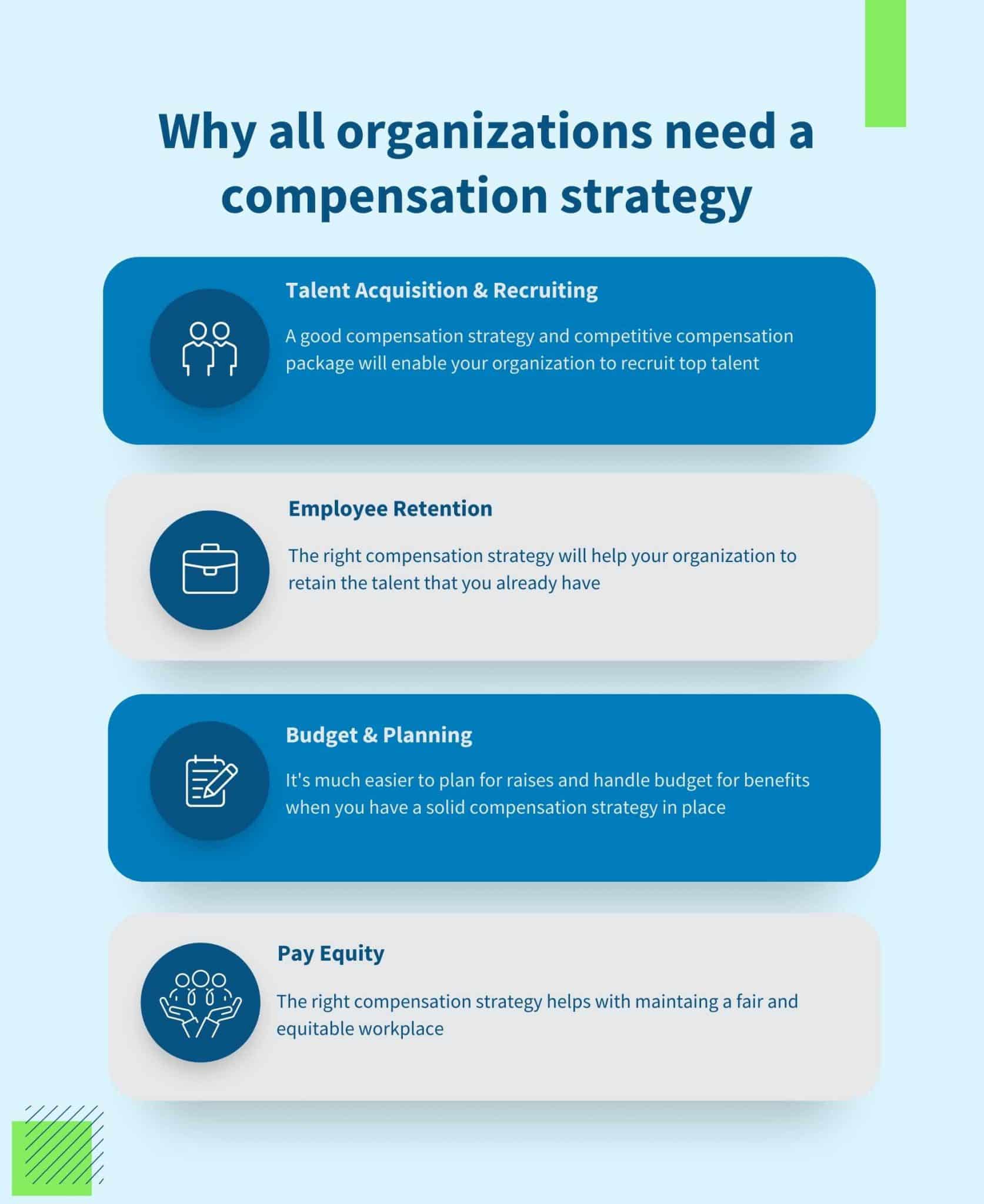How to Build a Successful Compensation Strategy
Written by Heather Bussing
October 14, 2022

A compensation strategy sets out the organization’s approach to pay and benefits. It has the guiding principles on compensation decisions and looks at pay in the context of the organization's overall goals.
You want your compensation strategy to be consistent with the organization’s business strategy, the performance the organization wants to encourage, and of course, the budget.
Somewhere along the way, the word strategy became a buzzword to mean high-level and important considerations without any much discussion of what you need and how to get there. It's like having a camping strategy to spend the night outdoors without thinking about how to stay fed, warm and dry.
Creating a compensation strategy is thinking about how to meet the fundamental needs of the organization and the people who work there. It's considering what the company wants to achieve in a certain timeframe, what it needs to get there, and how to find the resources and workers who can do it.
The difficulty is that every organization's goals and needs are going to be different. It's a custom fit process that requires consideration of the work, the market, and predictions about what may happen. There are many ways to do it right and you and your organization's leaders are the experts on what will work for you.
Why all organizations need a compensation strategy

Labor costs are the biggest line item of most organizations' budget. And having the right people doing the work is what makes a business successful. So, getting pay right is essential to operations, no matter what your industry or company size.
Having a clear compensation strategy will also help you recruit and retain employees and make budget and planning easier and more straightforward.
- Recruiting
Even if you are not planning on hiring soon, you may have people leave (or want someone to leave). When you are hiring for an unexpected opening, you want to understand who you need, where to find them, and what the going pay for the role is.
For larger organizations who can predict their overall turnover, although not usually who will leave, having guiding principles for salary ranges, incentive pay, benefits, and other pay decisions makes negotiations smoother and faster for everyone.
- Retention
Pay raises are usually larger when people change jobs than if they stay for the annual cost-of-living adjustment and scheduled pay increase. While changing jobs involves many factors besides pay, being prepared to meet the market can be a key to keeping the people you have.
- Budget and Planning
It's much better to be able to plan for raises and handle budget for benefits when you know what you know your strategy for compensation in general, what's going on in the market, and have thought through your approach to staying competitive. Some organizations take a straightforward approach and address base pay. Others may not have budget for big raises but can compete with other benefits, flexible schedules, or remote work. The important thing is to have the information you need, know your priorities, and have the guiding principles in place.
- Pay Equity
Pay equity is an important piece of compensation strategy. As you bring new people in at higher rates, it's essential to track what's happening overall with pay equity and whether any pay gaps can be justified for legitimate business reasons or whether there is potential bias that can be correlated to gender, race, age, or other protected factors. Most pay equity issues are not intentional and can be difficult to spot. Monitoring pay equity will help you implement your compensation strategy and address any issues before they become bigger problems.
7 questions to ask for a successful compensation strategy
Here are the things to think through when you are building a compensation strategy.
- What is your compensation philosophy?
Start with your compensation philosophy. Identify the principles and practices your organization uses to make compensation decisions.
- Do you generally make offers at the mid-point of the market rate for that role? Or is it usually higher or lower? Why?
- What are the important considerations for how you determine incentive pay and how do you allocate incentive and base pay?
- What consideration do benefits, leave, bonuses, and perks play into decisions on wages?
The focus should be on why you pay people what you pay and what factors are important in how your total compensation is structured.
- Is your compensation philosophy working?
You can always do more of what you've been doing. But before you make that the default, it's worth understanding whether it's working. Before you start making compensation decisions, it's good to have a clearer picture of some key indicators.
- Track your turnover by role. Are you seeing higher than normal attrition?
- Look at average tenure by role. Is it trending longer or shorter? Do you know why?
- Are there gender pay gaps or other pay equity issues? When was your last pay equity audit?
- What's happening with employee engagement? Look deeper than the overall scores. Engagement data by department or demographic can reveal insights on where there are issues.
If you find potential issues, evaluate what role, if any, compensation is playing in employee satisfaction and turnover.
- Are you monitoring compliance?
There are some aspects of compensation that are required by law and not optional. Understanding and monitoring compliance with compensation laws should be an essential part of any compensation strategy.
- Have you met minimum wage, overtime, and payment requirements under local, state, and federal law for every location you have employees?
- Have you assessed pay equity and established a process to analyze and address any pay gaps?
- Are you up to date on new laws and changes regarding sick leave, parental leave, and other paid leave, pay transparencyrequirements, and other laws affecting compensation and payroll including laws on privacy and the transfer of data about employees.
- Does your compensation align with business strategy?
This is where you look at where the organization wants to go and what resources are allocated to getting there?
- What are the measurable goals for the company?
- Do you have the people you need to get the work done?
- Is there budget available to make sure you can hire and retain the people you need for the work?
- If not, identify gaps and what it takes to close them
If there is a significant mismatch between goals and compensation budget, then you need to adjust one or the other or both.
- Does your compensation align with the market?
This will tell you if your compensation budget is realistic and competitive.
- Are your current salary ranges competitive for your location and industry?
- In a rapidly shifting environment are you prepared to make adjustments?
- How do proposed changes affect pay equity?
If your compensation is not competitive, you will need to figure out how to adjust budget, or headcount and get creative with benefits and other aspects of total compensation.
- How does employee performance fit into your compensation strategy?
There is a bit of a myth that if employees meet goals and perform at or above expectations, they should get a raise each year. That's not always possible and often not how it works. There are many types of incentive pay designed to encourage certain performance besides annual raises or cost-of-living adjustments.
- Can you create bonuses tied to performance or meeting specific goals?
- Is your sales commission program effective?
- Do you have the right mix of base pay and incentive pay?
- Do you use vesting of stock options or other benefits to encourage retention?
- How does total compensation fit into your strategy?
Money is not always the most important thing to people. Schedule, the ability to work remote, paid time off, signing bonuses, help with retirement savings or student loan payments can all change the equation for potential and existing employees.
- Do you know what matters most to your employees?
- What benefits are used the most?
- What else could you offer that might make a difference to people you want to recruit or retain?
While money is always an important factor, there are many other aspects of total compensation that can make your organization stand out against the competition. Know what they are and regularly reevaluate what's possible.
Building a successful compensation strategy is about having the right information on your organization, the market, and the organization's goals, then determining what's working, what isn't, and exploring options.
It's not just about money. It's about budget, compliance, the competition for talent, and meeting employee needs and at least some wants. When you get your compensation strategy right from the start, monitoring progress and adjusting to change is much easier and effective.


Download our white paper to further understand how organizations across the country are using market data, internal analytics, and strategic communication to establish an equitable pay structure.
Insights You Need to Get It Right












